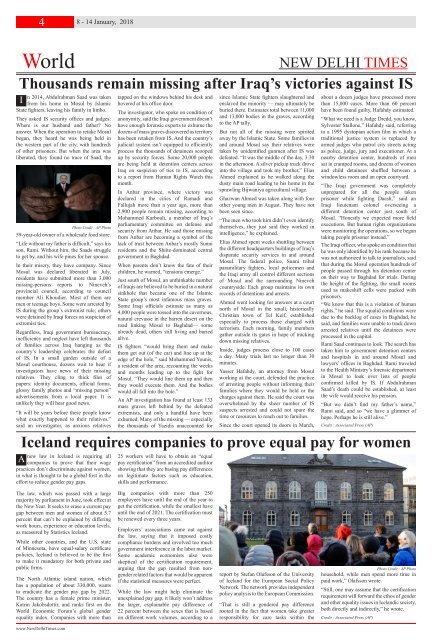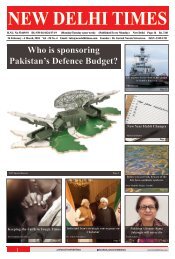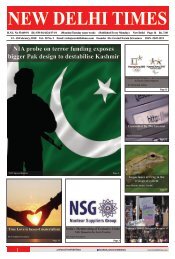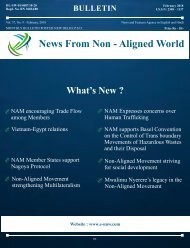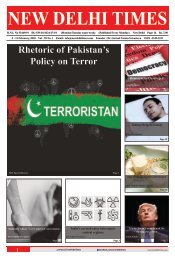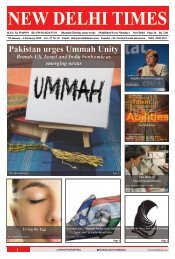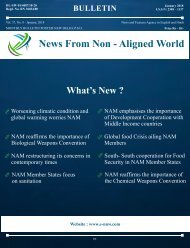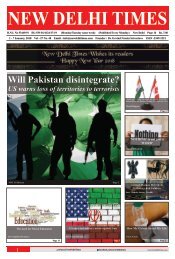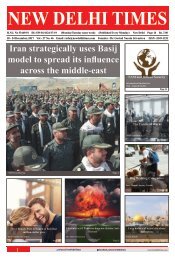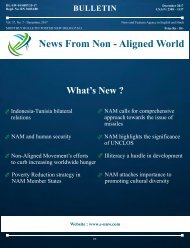8-14 January 2018 - 16-min
You also want an ePaper? Increase the reach of your titles
YUMPU automatically turns print PDFs into web optimized ePapers that Google loves.
4<br />
8 - <strong>14</strong> <strong>January</strong>, <strong>2018</strong><br />
World<br />
NEW DELHI TIMES<br />
Thousands remain missing after Iraq’s victories against IS<br />
I<br />
n 20<strong>14</strong>, Abdulrahman Saad was taken<br />
from his home in Mosul by Islamic<br />
State fighters, leaving his family in limbo.<br />
They asked IS security offices and judges:<br />
Where is our husband and father? No<br />
answer. When the operation to retake Mosul<br />
began, they heard he was being held in<br />
the western part of the city, with hundreds<br />
of other prisoners. But when the area was<br />
liberated, they found no trace of Saad, the<br />
Photo Credit : AP Photo<br />
59-year-old owner of a wholesale food store.<br />
“Life without my father is difficult,” says his<br />
son, Rami. Without him, the Saads struggle<br />
to get by, and his wife pines for her spouse.<br />
In their misery, they have company. Since<br />
Mosul was declared liberated in July,<br />
residents have submitted more than 3,000<br />
missing-persons reports to Nineveh’s<br />
provincial council, according to council<br />
member Ali Khoudier. Most of them are<br />
men or teenage boys. Some were arrested by<br />
IS during the group’s extremist rule; others<br />
were detained by Iraqi forces on suspicion of<br />
extremist ties.<br />
Regardless, Iraqi government bureaucracy,<br />
inefficiency and neglect have left thousands<br />
of families across Iraq hanging as the<br />
country’s leadership celebrates the defeat<br />
of IS. In a small garden outside of a<br />
Mosul courthouse, dozens wait to hear if<br />
investigators have news of their missing<br />
relatives. They cling to thick files of<br />
papers: identity documents, official forms,<br />
glossy family photos and “missing person”<br />
advertisements from a local paper. It is<br />
unlikely they will hear good news.<br />
“It will be years before these people know<br />
what exactly happened to their relatives,”<br />
said an investigator, as anxious relatives<br />
tapped on the windows behind his desk and<br />
hovered at his office door.<br />
The investigator, who spoke on condition of<br />
anonymity, said the Iraqi government doesn’t<br />
have enough forensic experts to exhume the<br />
dozens of mass graves discovered as territory<br />
has been retaken from IS. And the country’s<br />
judicial system isn’t equipped to efficiently<br />
process the thousands of detainees scooped<br />
up by security forces. Some 20,000 people<br />
are being held at detention centers across<br />
Iraq on suspicion of ties to IS, according<br />
to a report from Human Rights Watch this<br />
month.<br />
In Anbar province, where victory was<br />
declared in the cities of Ramadi and<br />
Fallujah more than a year ago, more than<br />
2,900 people remain missing, according to<br />
Mohammed Karbouli, a member of Iraq’s<br />
parliamentary committee on defense and<br />
security from Anbar. He said those missing<br />
from Anbar are beco<strong>min</strong>g a symbol of the<br />
lack of trust between Anbar’s mostly Sunni<br />
residents and the Shiite-do<strong>min</strong>ated central<br />
government in Baghdad.<br />
When parents don’t know the fate of their<br />
children, he warned, “tensions emerge.”<br />
Just south of Mosul, an unthinkable number<br />
of Iraqis are believed to be buried in a natural<br />
sinkhole that became one of the Islamic<br />
State group’s most infamous mass graves.<br />
Some Iraqi officials estimate as many as<br />
4,000 people were tossed into the cavernous,<br />
natural crevasse in the barren desert on the<br />
road linking Mosul to Baghdad— some<br />
already dead, others still living and buried<br />
alive.<br />
IS fighters “would bring them and make<br />
them get out (of the car) and line up at the<br />
edge of the hole,” said Mohammed Younis,<br />
a resident of the area, recounting the weeks<br />
and months leading up to the fight for<br />
Mosul. “They would line them up and then<br />
they would execute them. And the bodies<br />
would all fall into the hole.”<br />
An AP investigation has found at least 133<br />
mass graves left behind by the defeated<br />
extremists, and only a handful have been<br />
exhumed. Many of the missing — especially<br />
the thousands of Yazidis unaccounted for<br />
since Islamic State fighters slaughtered and<br />
enslaved the <strong>min</strong>ority — may ultimately be<br />
buried there. Estimates total between 11,000<br />
and 13,000 bodies in the graves, according<br />
to the AP tally.<br />
But not all of the missing were spirited<br />
away by the Islamic State. Some families in<br />
and around Mosul say their relatives were<br />
taken by unidentified gunmen after IS was<br />
defeated. “It was the middle of the day, 3:30<br />
in the afternoon. A silver pickup truck drove<br />
into the village and took my brother,” Elias<br />
Ahmed explained as he walked along the<br />
dusty main road leading to his home in the<br />
sprawling Bijwaniya agricultural village.<br />
Ghazwan Ahmed was taken along with four<br />
other young men in August. They have not<br />
been seen since.<br />
“The men who took him didn’t even identify<br />
themselves, they just said they worked in<br />
intelligence,” he explained.<br />
Elias Ahmed spent weeks shuttling between<br />
the different headquarters buildings of Iraq’s<br />
disparate security services in and around<br />
Mosul. The federal police, Sunni tribal<br />
paramilitary fighters, local policemen and<br />
the Iraqi army all control different sections<br />
of Mosul and the surrounding Nineveh<br />
countryside. Each group maintains its own<br />
records of detentions and arrests.<br />
Ahmed went looking for answers at a court<br />
north of Mosul in the small, historically<br />
Christian town of Tel Keif, established<br />
especially to process those charged with<br />
terrorism. Each morning, family members<br />
gather outside its gates in hope of tracking<br />
down missing relatives.<br />
Inside, judges process close to 100 cases<br />
a day. Many trials last no longer than 30<br />
<strong>min</strong>utes.<br />
Yasser Hafahdy, an attorney from Mosul<br />
working at the court, defended the practice<br />
of arresting people without infor<strong>min</strong>g their<br />
families where they would be held or the<br />
charges against them. He said the court was<br />
overwhelmed by the sheer number of IS<br />
suspects arrested and could not spare the<br />
time or resources to reach out to families.<br />
Since the court opened its doors in March,<br />
about a dozen judges have processed more<br />
than 15,000 cases. More than 60 percent<br />
have been found guilty, Hafahdy estimated.<br />
“What we need is a Judge Dredd, you know,<br />
Sylvester Stallone,” Hafahdy said, referring<br />
to a 1995 dystopian action film in which a<br />
traditional justice system is replaced by<br />
armed judges who patrol city streets acting<br />
as police, judge, jury and executioner. At a<br />
nearby detention center, hundreds of men<br />
sat in cramped rooms, and dozens of women<br />
and child detainees shuffled between a<br />
windowless room and an open courtyard.<br />
“The Iraqi government was completely<br />
unprepared for all the people taken<br />
prisoner while fighting Daesh,” said an<br />
Iraqi lieutenant colonel overseeing a<br />
different detention center just south of<br />
Mosul. “Honestly we expected more field<br />
executions. But human rights organizations<br />
were monitoring the operations, so we began<br />
taking people prisoner instead.”<br />
The Iraqi officer, who spoke on condition that<br />
he was only identified by his rank because he<br />
was not authorized to talk to journalists, said<br />
that during the Mosul operation hundreds of<br />
people passed through his detention center<br />
on their way to Baghdad for trials. During<br />
the height of the fighting, the small rooms<br />
used as makeshift cells were packed with<br />
prisoners.<br />
“We know that this is a violation of human<br />
rights,” he said. The squalid conditions were<br />
due to the backlog of cases in Baghdad, he<br />
said, and families were unable to track down<br />
arrested relatives until the detainees were<br />
processed in the capital.<br />
Rami Saad continues to look. The search has<br />
taken him to government detention centers<br />
and hospitals in and around Mosul and<br />
lawyers’ offices in Baghdad. Rami traveled<br />
to the Health Ministry’s forensic department<br />
in Mosul to look over lists of people<br />
confirmed killed by IS. If Abdulrahman<br />
Saad’s death could be established, at least<br />
the wife would receive his pension.<br />
“But we didn’t find my father’s name,”<br />
Rami said, and so “we have a glimmer of<br />
hope. Perhaps he is still alive.”<br />
Credit : Associated Press (AP)<br />
Iceland requires companies to prove equal pay for women<br />
A<br />
new law in Iceland is requiring all<br />
companies to prove that their wage<br />
practices don’t discri<strong>min</strong>ate against women,<br />
in what is thought to be a global first in the<br />
effort to reduce gender pay gaps.<br />
25 workers will have to obtain an “equal<br />
pay certification” from an accredited auditor<br />
showing that they are basing pay differences<br />
on legitimate factors such as education,<br />
skills and performance.<br />
The law, which was passed with a large<br />
majority by parliament in June, took effect at<br />
the New Year. It seeks to erase a current pay<br />
gap between men and women of about 5.7<br />
percent that can’t be explained by differing<br />
work hours, experience or education levels,<br />
as measured by Statistics Iceland.<br />
While other countries, and the U.S. state<br />
of Minnesota, have equal-salary certificate<br />
policies, Iceland is believed to be the first<br />
to make it mandatory for both private and<br />
public firms.<br />
The North Atlantic island nation, which<br />
has a population of about 330,000, wants<br />
to eradicate the gender pay gap by 2022.<br />
The country has a female prime <strong>min</strong>ister,<br />
Katrin Jakobsdottir, and ranks first on the<br />
World Economic Forum’s global gender<br />
equality index. Companies with more than<br />
Big companies with more than 250<br />
employees have until the end of the year to<br />
get the certification, while the smallest have<br />
until the end of 2021. The certification must<br />
be renewed every three years.<br />
Employers’ associations came out against<br />
the law, saying that it imposed costly<br />
compliance burdens and involved too much<br />
government interference in the labor market.<br />
Some academic economists also were<br />
skeptical of the certification requirement,<br />
arguing that the gap resulted from nongender<br />
related factors that would be apparent<br />
if the statistical measures were perfect.<br />
While the law might help eli<strong>min</strong>ate the<br />
unexplained pay gap, it likely won’t address<br />
the larger, explainable pay difference of<br />
22 percent between the sexes that is based<br />
on different work volumes, according to a<br />
report by Stefan Olafsson of the University<br />
of Iceland for the European Social Policy<br />
Network. The network provides independent<br />
policy analysis to the European Commission.<br />
“That is still a gendered pay difference<br />
rooted in the fact that women take greater<br />
responsibility for care tasks within the<br />
household, while men spend more time in<br />
paid work,” Olafsson wrote.<br />
“Still, one may assume that the certification<br />
requirement will forward the ethos of gender<br />
and other equality issues in Icelandic society,<br />
both directly and indirectly,” he wrote.<br />
Credit : Associated Press (AP)<br />
Photo Credit : AP Photo<br />
www.NewDelhiTimes.com


